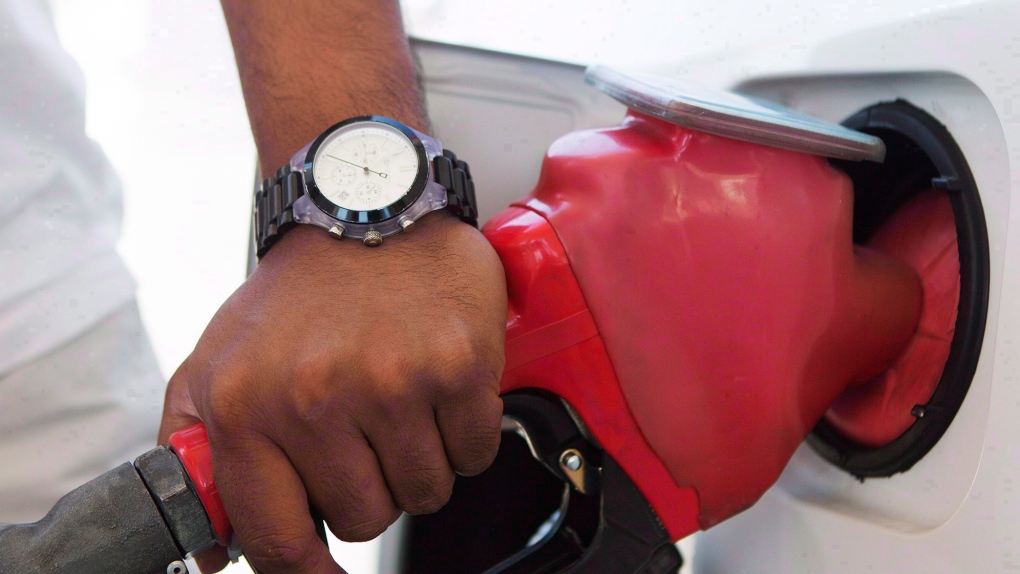How to maximize fuel efficiency as gas prices reach record highs
 A person pumps fuel in Toronto. (THE CANADIAN PRESS/Michelle Siu)
A person pumps fuel in Toronto. (THE CANADIAN PRESS/Michelle Siu)
Drivers across Canada are feeling the pain at the pumps as gas prices continue to reach record highs due to the conflict in Ukraine.
The sky-high prices have even prompted some residents of British Columbia to travel across the U.S. border into Point Roberts to fill up their tanks and save a few bucks.
But one local expert says those looking to save money closer to home can follow a series of tips designed to maximize fuel efficiency.
Josh Smythe, an automotive specialist and customer care manager at BCAA, told CTV News Vancouver Tuesday that drivers will notice savings over time if they follow these simple tricks.
Service your car regularly and keep tires properly inflated
According to Smythe, one of the most important things drivers can do to get more out of their tank is to ensure their vehicle is properly maintained.
"Maintenance plays a huge part in making sure the power or the energy supplied by the fuel actually gets to the road," he says. "There's this energy loss through the engine just from road contact, so you're not getting 100 per cent of power out of the fuel to the road. But the better maintained your vehicle is, the less resistance, less friction, and less power loss."
Smythe adds that one of the biggest misnomers is tire pressure.
"Some think if they have 35 pounds in their tire and it helps roll better because there's less friction, then with 45 pounds in their tire, it should be even better, but that's not the case," he says.
"Over-pressurizing your tires to get a marginally different fuel consumption…what you're saving with that is being eliminated by needing to replace your tires prematurely."
Avoid aggressive driving
BCAA says punching the pedal can increase fuel consumption by up to 37 per cent, and it doesn't necessarily get you anywhere faster.
"If you're driving aggressive then you're braking aggressive," Smythe says. "So now all this fuel that you use to get the momentum of your vehicle in motion is being eliminated because you need to hit the brakes again."
Lighten the load and make your car more aerodynamic
Removing excess weight and roof racks when you're not using them is another key factor in driving smarter, Smythe says.
"If you have excessive weight in your car, your engine has to work extra hard in order to get all this weight moving," he says. "When you're hitting your brakes, you're now removing the power that you put into the car for forward motion…so it's counterproductive for mileage."
Take the path of least resistance
Smythe says another tip to keep in mind is planning your trips ahead of time to help avoid high-traffic areas and driving during rush hour.
BCAA also recommends that drivers consolidate errands into one trip or to combine them with your daily commute.
Don’t sit idle
BCAA also recommends that drivers don't sit idle for more than 60 seconds and that shutting off and re-starting your engine actually consumes less fuel than keeping your vehicle running.
"All of these things as individual tips might not necessarily get you a measurable result," Smythe says. "But if you're following all of these tips, over time you will certainly see that it's costing you less."
CTVNews.ca Top Stories

Can the Governor General do what Pierre Poilievre is asking? This expert says no
A historically difficult week for Prime Minister Justin Trudeau and his Liberal government ended with a renewed push from Conservative Leader Pierre Poilievre to topple this government – this time in the form a letter to the Governor General.
Two U.S. Navy pilots shot down over Red Sea in apparent 'friendly fire' incident, U.S. military says
Two U.S. Navy pilots were shot down Sunday over the Red Sea in an apparent 'friendly fire' incident, the U.S military said, marking the most serious incident to threaten troops in over a year of America targeting Yemen's Houthi rebels.
Ottawa MP Mona Fortier appointed chief government whip
Ottawa-Vanier MP Mona Fortier has been appointed as chief government whip, the latest addition in a major reshuffle of Prime Minister Justin Trudeau's cabinet.
opinion Tom Mulcair: Prime Minister Justin Trudeau's train wreck of a final act
In his latest column for CTVNews.ca, former NDP leader and political analyst Tom Mulcair puts a spotlight on the 'spectacular failure' of Prime Minister Justin Trudeau's final act on the political stage.
B.C. mayor gets calls from across Canada about 'crazy' plan to recruit doctors
A British Columbia community's "out-of-the-box" plan to ease its family doctor shortage by hiring physicians as city employees is sparking interest from across Canada, says Colwood Mayor Doug Kobayashi.
Bluesky finds with growth comes growing pains - and bots
Bluesky has seen its user base soar since the U.S. presidential election, boosted by people seeking refuge from Elon Musk's X, which they view as increasingly leaning too far to the right given its owner's support of U.S. president-elect Donald Trump, or wanting an alternative to Meta's Threads and its algorithms.
Big splash: Halifax mermaid waves goodbye after 16 years
Halifax's Raina the Mermaid is closing her business after 16 years in the Maritimes.
Arizona third-grader saves choking friend
An Arizona third-grader is being recognized by his local fire department after saving a friend from choking.
opinion King Charles' Christmas: Who's in and who's out this year?
Christmas 2024 is set to be a Christmas like no other for the Royal Family, says royal commentator Afua Hagan. King Charles III has initiated the most important and significant transformation of royal Christmas celebrations in decades.

































